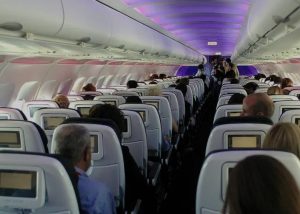
Air quality on airplanes has been a topic of concern for many travellers, especially in light of the COVID-19 pandemic. With more people returning to air travel, it is important to understand just how clean the air is on planes.
One common misconception is that the air on airplanes is recycled and stagnant, leading to a buildup of germs and viruses. However, this is not entirely true. Most modern aircraft are equipped with high-efficiency particulate air (HEPA) filters that can remove up to 99.9% of particles, including viruses, bacteria, and allergens, from the air.
In addition to HEPA filters, airplanes also have a system that continuously brings in fresh outside air and circulates it throughout the cabin. This means that the air on planes is constantly being refreshed and exchanged, reducing the risk of airborne transmission of viruses.
While the air on planes is generally clean and safe to breathe, it is still important to take precautions when traveling, such as wearing a mask, practicing good hand hygiene, and maintaining social distancing whenever possible. By following these guidelines, you can help ensure a safe and comfortable travel experience.
Now you can clean & kill 99.9% of germs without toxic chemicals. BS - approved. Sign up to get 10% off.